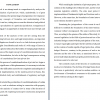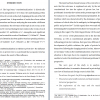Тема: Constitutionalization of private law
Закажите новую по вашим требованиям
Представленный материал является образцом учебного исследования, примером структуры и содержания учебного исследования по заявленной теме. Размещён исключительно в информационных и ознакомительных целях.
Workspay.ru оказывает информационные услуги по сбору, обработке и структурированию материалов в соответствии с требованиями заказчика.
Размещение материала не означает публикацию произведения впервые и не предполагает передачу исключительных авторских прав третьим лицам.
Материал не предназначен для дословной сдачи в образовательные организации и требует самостоятельной переработки с соблюдением законодательства Российской Федерации об авторском праве и принципов академической добросовестности.
Авторские права на исходные материалы принадлежат их законным правообладателям. В случае возникновения вопросов, связанных с размещённым материалом, просим направить обращение через форму обратной связи.
📋 Содержание
1. Theoretical aspects of constitutionalization 7
§ 1.1 Constitutionalization in historical perspective 7
§ 1.2 The ways and the results of constitutionalization 19
2. The publicness of Private Law values. Realization of equality 25
§ 2.1 The constitutional principle of equality in contractual relations 25
§ 2.2 The impact of constitutional provisions on private property rights 37
3. The system of constitutional and legal regulation in the field of Patent Law. 51
§ 3.1The public-private nature of patents law 51
Conclusion 65
List of references 67
📖 Введение
This study considers constitutionalization in relation to private law. The influence of modern constitutional law on private law is so profound that a separate term has appeared in legal science to denote the result of this influence.
The topic had been chosen because of its undeniable relevance. It is important to note that the relevance is explained not only by the intensive implementation of constitutional law into the sphere of private law, but also by the existence of problematic issues that have arisen at the present stage of development of this doctrine. For instance, it is a question of the historical peculiarities. It is worth noting the socialist tradition, which was characterized by the dominance of public law in legislation, the existence of which often led to ambiguity in distinguishing the relationship between public and private law . In this regard, there were and still are a lot of challenges in determining the boundaries between these two branches of law and resolving disputes arising in this regard. The following problems will be analyzed in this study.
The novelty of the phenomenon lies in the fact that constitutional rights and freedoms, as well as constitutional principles, initially did not have the goal of influencing private law relations, their goal was different, but at a certain stage in the development of public relations, the goals of private law regulation changed by themselves following the changing needs of society. Moreover, at the present stage there are not many works on the constitutionalization of private law. It is necessary to draw attention to this topic due to its complexity and multidimensionality. This approach enables to look at the traditional civilizational problems from a completely different perspective.
The main goal of the study is to analyze theoretical concept of constitutionalization, its normative framework in private legislation and corresponding case-law of Russian and foreign courts in this field.
To achieve this goal, the following objectives were defined:
• The analysis of scientific materials and determination of stages of development in historical perspective;
• The exploration of the ways and the results of implementation of constitutionalization;
• The consideration of the establishment of contractual relations based on the principle of equality;
• The analysis of private property rights and the impact of constitutional provisions;
• The exploration of the public-private nature of patents law;
• The summarizing of relevant problems and drafting proposals for their resolution.
...
✅ Заключение
The research consists of the analysis of the case-law arising from the difficulties of distinguishing between laws and legal interpretation. An important clarification is that these disputes are bound to involve a clash between private law norms and fundamental rights. Consideration and study of a wide range of issues in this area allows us to form general ideas about the totality of emerging legal relations and their features. The essence of the legal concept of constitutionalization lies not only in the legal nature of the institution, but also in the legal consequences arising from the implementation of constitutional law into private law.
Practice shows that the process of constitutionalization of private law began a long time ago. Noting the significance of this phenomenon, it is necessary to take into account ways to overcome the difficulties caused by the complexity and ambiguity of the nature of its practical implementation. In the modern period in Russia, this doctrine requires more detailed study and establishment of regulatory and legal limits.
The paper illustrated in detail the peculiarities of constitutionalisation of certain institutions of private law, such as relations arising in connection with property rights, patent rights and the analysis of contract law in terms of the doctrine of protection of the "weak" party. By exploring each aspect conclusions and general recommendations have been made.
While studying the institution of private property, the author believes that the solution to the challenges lies within the state, and the resolution is the necessity to maintain legislative stability. The state must protect the commonwealth, the implementation of fundamental rights and freedoms and constitutional guarantees. However, at the same time, the boundaries of state intervention, harmonization of such relations should be preserved.
Examining the jurisprudence of the courts it was found that it is still very difficult to establish the boundaries of this intervention and it is not clear what ' common welfare' encompassed. The same is notices in the patent law legislation. Thus, according to the opinion of the author of this study, it is necessary to amend the current legislation in the field of protection and use of inventions, utility models, industrial designs created with the participation of the state, the purpose of which is to ensure equal rights and respect for the interests of all participants of legal relations on the creation of results capable of legal protection, obtained at the expense of the budget. However, contrary to the presence of such a strong influence of public interests and the role of the state, as mentioned above, we note that the rights of private individuals should be properly protected in this area. Issues related to judicial decisions seem to be relevant.
The scientific study of the theories of constitutionalization is a task which needs a lot of attention. The doctrine of foreign States should be taken into account. This issue is particularly relevant in modern realities. Academic researches and involvement of lawmakers' awareness to this matter could bring clarity to many public relations arising in this regard.





